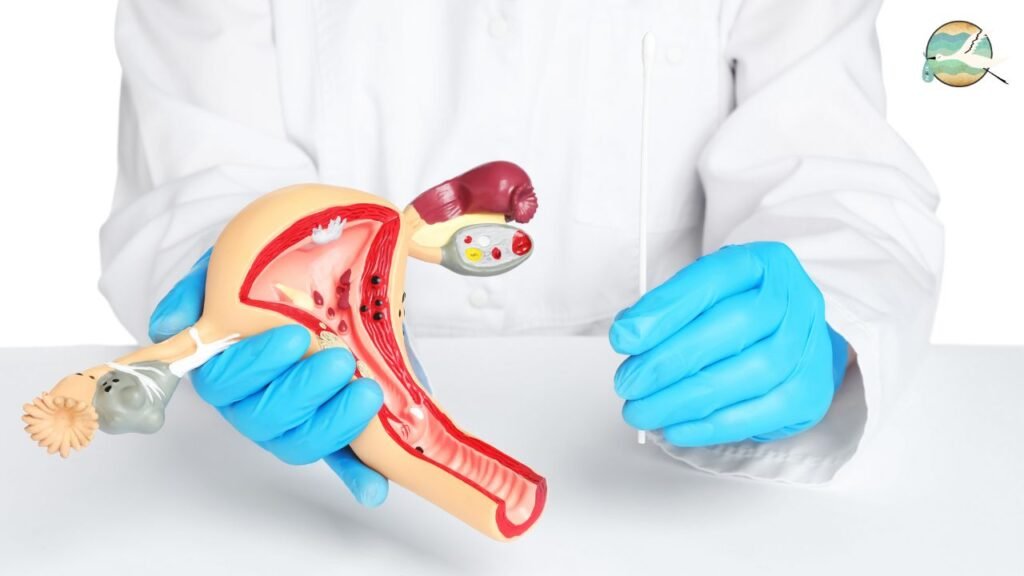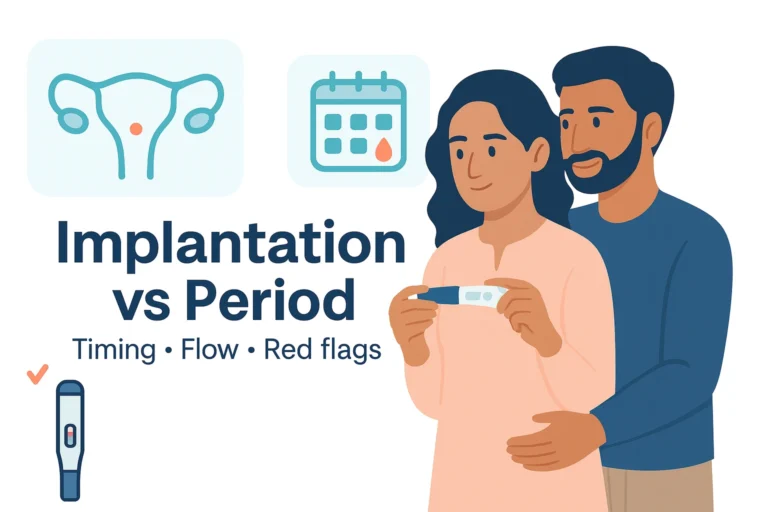Learn about the typical signs of blocked fallopian tubes to gain insight into this alarming condition that can affect female fertility. This in-depth article provides readers with precise and pertinent information by covering a variety of symptoms, causes, and potential treatments.
Couples trying to conceive may face significant challenges due to blocked fallopian tubes or tubal factor infertility. When one or both fallopian tubes are blocked, it is difficult for sperm to fertilize an egg and for the fertilized egg to pass through to the uterus. With the help of expert analysis and reliable sources, this article aims to provide a thorough understanding of the typical symptoms connected to blocked fallopian tubes.
What are the Common Symptoms of Blocked Fallopian Tube?

Some symptoms, which could point to possible fertility problems, might appear when a woman has fallopian tube obstruction. Indicators to watch out for include the following:
1. Irregular Menstrual Cycles
Menstrual cycle irregularity is one of the early indications of blocked fallopian tubes. Women may experience irregular cycle lengths, unusually heavy or light periods, or frequent spotting. This anomaly might be brought on by hormonal imbalances brought on by blocked tubes that interfere with the body’s normal reproductive process.
2. Pelvic Pain
Another sign of blocked fallopian tubes is persistent or recurrent pelvic pain. The pain may be constant, varying in intensity, or only present during particular menstrual cycle phases. To identify the source of the pain and rule out other possible problems, it is imperative to seek medical advice.
3. Painful Intercourse
Having a sexual encounter can be painful or uncomfortable if your fallopian tubes are blocked. Inflammation and sensitivity in the pelvic area could result from the obstruction, making intimacy uncomfortable or painful for some women.
4. Unexplained Infertility
Blocked fallopian tubes may be one of the underlying causes if a couple has tried to conceive for a long time without success. Unknown causes of infertility may warrant medical investigation, including tests to determine the health of the fallopian tubes.
5. History of Pelvic Infections
Blocked fallopian tubes are more likely in people with a history of pelvic inflammatory disease (PID) or other pelvic infections. The movement of sperm or eggs may be hampered by scarring or adhesions brought on by infections in the tubes.
6. Ectopic Pregnancy
When a fertilized egg implants itself outside of the uterus, typically in the fallopian tubes, it is called an ectopic pregnancy. This dangerous condition needs to be treated by a doctor right away. Although blocked tubes are not always a factor in ectopic pregnancy cases, it is important to be aware of this potential issue.
7. Abnormal Vaginal Discharge
Vaginal discharge that is unusual or offensive-smelling could be a sign of an infection or inflammation in the reproductive system, which includes the fallopian tubes. Any unusual discharge needs to be checked out right away by a medical professional.
8. Feeling Bloated
Bloating or a sensation of being overly full in the lower abdomen may occur in some women who have blocked fallopian tubes. The hormonal changes that take place during the menstrual cycle are typically linked to this sensation, which may happen periodically.
9. Painful or Frequent Urination
Blocked fallopian tubes can occasionally cause discomfort or more frequent urination. Pressure on the bladder brought on by swelling or adhesions in the pelvic region may be the cause of this symptom.
10. History of Sexually Transmitted Infections (STIs)
Sexually transmitted infections, particularly those that are not treated, can cause pelvic inflammatory disease, which in turn may cause blocked fallopian tubes. A more thorough evaluation should be requested given the history of STIs.
Causes of Blocked Fallopian Tube

For the best diagnosis and course of treatment, it is essential to comprehend the underlying causes of blocked fallopian tubes. This condition can arise from a variety of causes, including:
- Pelvic Inflammatory Disease (PID): A common reason for blocked fallopian tubes is PID. The uterus and other reproductive organs become infected by sexually transmitted bacteria like chlamydia or gonorrhea, which causes inflammation and scarring.
- Endometriosis: Endometriosis is a condition in which the uterine lining tissue spreads outside the uterus, frequently affecting and obstructing the fallopian tubes. Endometrial tissue in the tubes has the potential to interfere with their normal operation.
- Previous Abdominal or Pelvic Surgery: Surgery in the abdominal or pelvic area, such as an appendectomy or the removal of an ovarian cyst, can result in adhesions or the formation of scar tissue, which can block the fallopian tubes.
- Uterine Infections: The fallopian tubes may become inflamed and blocked as a result of uterine infection spread there.
- Pelvic Tuberculosis: The fallopian tubes can be affected by tuberculosis, which can result in scarring and obstruction.
- Congenital Anomalies: Women may occasionally be born with structural flaws in their fallopian tubes, which increases their risk of blockages.
- Previous Ectopic Pregnancy: An earlier ectopic pregnancy can cause scarring and damage, especially if it took place in the fallopian tubes, raising the possibility of blockage.
- Noncancerous Growths: Noncancerous growths in the reproductive organs, such as polyps or fibroids, can put pressure on the fallopian tubes and cause blockages.
- Intrauterine Device (IUD) Usage: Long-term use of intrauterine contraceptive devices may raise the risk of infections and inflammation in the reproductive system, which could have an impact on the fallopian tubes.
- Sexually Transmitted Infections (STIs): PID and subsequent fallopian tube blockage are consequences of untreated or recurrent STIs.
Diagnosis of Blocked Fallopian Tube

There are several diagnostic techniques that can help determine the condition when a woman exhibits signs of blocked fallopian tubes or struggles with unexplained infertility:
Hysterosalpingogram (HSG)
In order to perform a diagnostic imaging test called an HSG, a contrast dye must be injected into the fallopian tubes and uterus. After that, X-rays are taken to identify any obstructions or irregularities in the tubes.
Laparoscopy
A small abdominal incision is used during laparoscopy to insert a thin, illuminated instrument (laparoscope). The fallopian tubes and neighboring structures can be seen clearly.
Transvaginal Ultrasound
In order to identify any anomalies, ultrasound imaging can offer useful information about the health of the uterus and fallopian tubes.
Hormone Testing
Unbalanced hormones can cause fallopian tube blockages and have an impact on fertility. Hormone levels can be measured through blood work, which can help with treatment choices.
Medical History and Physical Examination
Potential risk factors can be found and further diagnostic steps can be guided by a thorough medical history and physical examination.
What Is the Reason for Having IVF Treatment?
FAQs: Common Symptoms of Blocked Fallopian Tube
Q: Can blocked fallopian tubes be treated?
Blocked fallopian tubes can be treated in some circumstances, yes. The severity and location of the blockage determine the best course of treatment. Options include in vitro fertilization (IVF), fertility drugs to enhance ovulation, or surgery to remove adhesions or obstructions.
Q: Can blocked fallopian tubes cause miscarriages?
Yes, having blocked fallopian tubes can make miscarriages more likely. An ectopic pregnancy, which is not viable and may end in miscarriage, can occur when the egg is fertilized in the fallopian tube rather than the uterus.
Q: Are there any natural remedies for blocked fallopian tubes?
Although some sources recommend specific natural treatments for clearing blocked fallopian tubes, there is little scientific proof to back up their efficacy. To receive the best medical advice and care, it is essential to speak with a healthcare professional.
Q: Can I still get pregnant with one blocked fallopian tube?
Yes, it is still possible to become pregnant if one of your fallopian tubes is blocked, especially if the other tube is sound and working normally. However, the likelihood of conception might be diminished, and getting pregnant might take longer.
Q: Can sexually transmitted infections lead to blocked fallopian tubes in men?
Although STIs primarily affect women’s reproductive organs, they can also cause inflammation in men, resulting in prostatitis or epididymitis (inflammation of the epididymis or the prostate). The passage of sperm may be obstructed by these conditions.
Q: Can lifestyle changes improve fallopian tube health?
Although altering one’s lifestyle won’t necessarily clear up blocked fallopian tubes, doing so can improve fertility and overall reproductive health. This entails maintaining a healthy weight, working out frequently, controlling stress, and abstaining from alcohol and tobacco use.
Conclusion: Common Symptoms of Blocked Fallopian Tube
Women who are trying to get pregnant need to be aware of the typical signs of blocked fallopian tubes. Successful treatment and conception outcomes can be increased with early detection and prompt intervention. Consult a licensed healthcare professional for an in-depth evaluation and individualized advice if you experience any of the symptoms listed in this article or are having trouble conceiving.
Keep in mind that a blocked fallopian tube does not always spell the end of your chances of having children. Many couples are able to overcome these obstacles and fulfill their dream of starting a family thanks to improvements in medical technology and treatments.









[…] Also Read: What are the Common Symptoms of Blocked Fallopian Tube? […]
[…] Blocked Fallopian Tubes: If a woman’s fallopian tubes become clogged or damaged, the egg and sperm’s trip may be disrupted, preventing […]
[…] ovary releases the egg during ovulation, which is then picked up by the fallopian tube. When sperm enters the reproductive system, it can fertilize the egg, resulting in pregnancy. […]